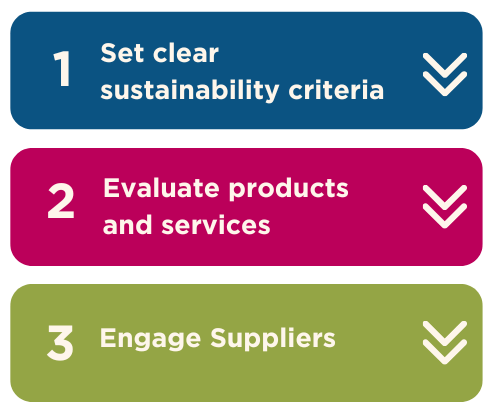IMPLEMENT: SUSTAINABLE PURCHASING & SUPPLIERS
Supply Chains are a Significant Portion of Wine’s Carbon Footprint
A significant part of any product’s carbon footprint, including wine, is attributed to the supply chain. Estimates vary, but anywhere from 50-80% of a wine’s carbon footprint comes from the supply chain. Therefore, addressing sustainability within the supply chain through procurement decisions and engaging with suppliers (along with optimizing transportation) is an important part of any climate action plan.
Sustainable Purchasing Practices Can Reduce Wine’s Carbon Footprint
Traditional procurement approaches often prioritize cost and efficiency over environmental and social considerations. Making procurement decisions with sustainability in mind means that environmental and social factors are also considered along with economic factors, which can reduce the carbon footprint of purchased products.

Implementing sustainable purchasing practices can be accomplished in several steps:
-
Set clear sustainability criteria: Sustainability requirements for products or services can be informal or included in a sustainable purchasing policy. The criteria can specify sustainability requirements such as use of recycled materials, energy efficient products, local sourcing, etc.
-
Evaluate products and services: Evaluate your suppliers and their products based on your sustainability criteria and prioritize suppliers that align with your sustainability goals.
-
Engage suppliers for information and to improve practices: Seek information from suppliers about their products if not readily available and collaborate with suppliers that are also interested in improving the sustainability of their practices and products.
Vineyard & Winery Supply Chains - Scope 3 Emission Sources
The GHGs attributed to Scope 3 (indirect emissions from the supply chain) encompass any activity not under direct responsibility of the vineyard or winery operation. These include activities such as:
-
Purchased products (e.g., purchased grapes, winery equipment, vineyard inputs)
-
Packaging materials (e.g., bottles, labels, closures, capsules, boxes)
-
Outsourced transportation (e.g., delivery of purchased grapes, distribution of wine)
-
Outsourced production (e.g., third-party harvest, bottling)
-
Business travel (e.g., daily commutes, meetings, sales travel)
-
Offsite waste management (e.g., landfill, recycling, composting)
-
Post-consumption (e.g., disposal of wine containers)
Collaborating with Supply Partners Can Drive Climate Action
By actively collaborating with suppliers and emphasizing sustainable procurement practices, organizations can motivate their supply partners to minimize their environmental footprint. This approach can create ripple effects that extend far beyond your organization, promoting broader environmental and social responsibility across the entire industry. You can implement these sustainability strategies with both existing suppliers and when evaluating potential new supply partners.

-
Sustainable Purchasing Implementation Guide: Details sustainable purchasing considerations and provides resources for creating a sustainable purchasing plan, engaging with suppliers, packaging and machinery.
-
Supplier Questionnaire: Provides example questions for suppliers to assist with the screening process for products and services.
-
Sustainable Purchasing Policy Template: Provides guidance for a sustainable procurement policy and includes a checklist for sustainable procurement and other useful resources.
